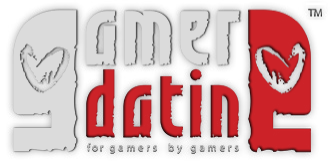Games Are The Solution, Not the Problem
Posted By:
![]() Melissa - July 08, 2015
Melissa - July 08, 2015
“Video games ruined my last relationship.”
Working for a gamer dating site, gaming guilt comes up all the time. It breaks my heart to hear the repeated stories of normal relationship challenges being misconstrued as the inevitable fault of video games when it is the games that can help us through those tough situations. To date a gamer is the same as dating anyone who has a passion for something and there are even a few things we do better.
It’s a sunny Tuesday and I’m taking a sun break to chat with a new friend. He is an incredible guy: a talented musician, wildly intelligent and a skilled gamer. He and Jordan have been in the back yard playing music most sunny afternoons for the past couple of weeks and it has made for a pretty pleasant work soundtrack. I keep trying to get him to stay for dinner and games but he always seems to have something else to do. Today, I was drawn away from my computer by the sounds of Jordan showing him one of our favorite Tallest Man on Earth songs. He asked how work was going and before long we were in an intense conversation (another thing I love about this guy: in-depth conversation is the norm). Having no problem multitasking, he absently plucked away the intricate riffs he had only just been shown while explaining to me what he currently saw as the biggest failure of his life so far and how he believed everything could have been different if he just wasn't a gamer.
I inwardly cringed as he unfolded layer after layer of his unhappy relationship, blaming each squarely on on himself and his gaming. He was sure that if he hadn’t been gaming, he would still be with her. It was clear to me within the first few minutes that gaming wasn’t the problem. It might have been the missed solution, maybe even at times a symptom of the problem, but it definitely wasn’t the reason this awesome guy was sitting single before me. Right before we met, he was unceremoniously dumped by the girl he thought he would spend the rest of his life with. They had lived together happily in Hawaii for over three years, spending their days out on the beach, hiking the volcanos and generally doing as they pleased. They came to Oregon right as the cold season hit and he decided to tuck in to a new game. They weren’t really doing much as they didn’t know many people in town, so there was a lot of time spent with no real co-aim except to continue co-existing. Stress was mounting as both of them worked to find jobs in a state that isn’t currently known for overflowing job opportunities.
He turned to video games as a way to keep up his morale. With nothing to do together that they had previously enjoyed, the distance between them grew and grew. After a few months, she cheated on him, he forgave her and she dumped him a short time later.
“Sounds like a super-high-stress situation that could blow up with or without video games to me,” I said after hearing his story.
He was determined to be wrong - him and his video gaming.
“No, I was too busy leveling up to spend enough time with her.”
Learning to balance “me time” and “us time” in a relationship is not a quest specific to gamers and yet it is always the first thing I hear from gamers coming to the end of one with a non-gamer. I was left by a guy who didn’t understand why I wouldn’t come to bed at 10 pm, opting instead for a couple hours of whatever was engaging me at the time. It was really easy for both of us to blame the games instead of realistically looking at the things that were wrong. (Like that he was boring and over dependent, unable to see past his own desires to see that I use games as necessary relaxation. Or that he didn't care to be a part of my relaxation rituals other than me cooking dinner every night which became a chore, not a pleasure.) I’ve ended relationships with guys who were over-involved in their music and their career - both of them are good guys that didn’t get the balance right for me at the time. My not wanting to be with them didn’t mean they are bad people who should walk away from something they are good at and makes them happy. Their passions are a strong point. I find skill attractive and it gave them something to do that wasn’t sit on the couch next to me complaining that I’m using the TV. Well, they were just never there to complain about me using it.
“But it isn’t the games,” I insisted.
Gaming seems to be the only passion that automatically gets blamed for anything that goes awry in the passionate person’s life. Kid won’t sit still in school? They play video games. Aggressive attitude? They play video games. Poor time management? They play video games. Break up with a girl who admittedly didn’t emotionally satisfy you? Obviously, the video games.
Ugh. My heart.
In front of me, I had a really smart guy who was searching for a reason in all the madness and, at this point, he was more comfortable with guilt than the non-answers he was getting from his ex, so had chosen to turn against himself. I’ve seen my friends go through break ups and almost all of them went through the guilt phase at some point, if not as a regular part of their mourning the loss of a relationship. I’m definitely no exception. This part is super lame to live through, but on the other side of the tunnel can be a better, stronger you. Dealing with guilt means we have to ask ourselves questions and answers give us lessons to learn. The last thing I wanted to see happen was my friend making good on his threat to get rid of all of his gaming gear. There are so many things games do for us players, many of them with the direct potential to help him out of this slump.
“Do you know how good games are for you?”
Over the past few years while we have been creating GamerDating, there has been more and more research proving what we already knew: video games do not rot your brain. As we suspected while growing up attached to our computers and consoles, our brains get more exercise than our non-gaming counterpart’s. A scientific study in China lead by principal investigator Dezhong Yao, published in April of 2015, concluded that action video gamers have more grey matter and better integration of networks associated with attention and sensorimotor function. Though the scientific study of video games is still a relatively new field, data repeatedly shows that gaming improves learning ability, multi-tasking, perception, task-switching and decision making. These earned abilities add up to us gamers doing better in careers that require precision coordination. Over ten years ago now, an Iowa State University study showed that three hours of gameplay a week decreased surgeon mistakes by 37%.
Being able to look at tons of data and make sense of it quickly is going to be one of the most important skills many employers look for in our generation. We are in the age of “big data” and gamers are programmed for it. We are better at recognizing patterns and holding several templates in our minds at once. I’ve lectured for a while and feel that I have made my point, so I conclude and await my friend’s answer.
“I don’t know, I feel like maybe I should be doing something else. I’m 32,” he eventually sighed.
He had only known me for a few weeks and couldn’t possibly know he had just pounded one of my most volatile buttons.
“Did you know that as of this year, the average age of a gamer in the US is 31 which is an increase from last year and that only about a quarter of gamers are under 18?” I’ve had this conversation so many times I relish in the new numbers as they are published, committing them to memory for just such an occasion. “We adults should play games,” I begin. There is no question about gaming’s abilities to release dopamine in our brains. While as a kid, games were fun or maybe educational, as an adult, I use games to relieve some of the constant grind of “grown-up” life. At the end of a long day when you have worked your tail off but it doesn’t look like you have anything to show for it, you can pick up a controller and visibly accomplish something.
Yes, as adults we need to be mindful of certain things that we didn’t have to worry about as kids: getting too involved with a dungeon the night before I have a big deal meeting, if I have as much Mt.Dew as I used to drink in a game session I might be really ill and not happy about the shape of my jeans and I’m still working on remembering that I’m doing laundry and switching it before it starts smelling a little weird in the washer. But really, how is that any different than lessons we learned playing video games as kids except with “adult” challenges like a job that is way harder than school was, a normal metabolism and having to do my own laundry (which more and more I’m seeing that I was spoiled in that regard and probably should have figured this out sooner)? Video games give me a place to learn and be good AND bad at something. There is a lot of pressure on us to be perfect kids and productive members of society. Sometimes failing at that can feel like the end of the world. Video games give me a situation where I can lose and the world doesn't completely end (most of the time).
This prepared me for a world where we fail all the time and while sometimes you really do get a ‘game over’, many more times someone holds off the enemy while I wait to respawn. My armor might be a bit damaged, but I’ve learned something (hopefully).
Video games give me a world of endless possibilities and entertainment that allows me to be creative and engaged.
Video games have brought my boyfriend and I closer together - getting us through some really hard times. The common goals set to us by games gave us something that we could achieve as a pair.
Video games can be used to help people recuperate from trauma, manage pain, ward off mental illness and learn real life skills. If you haven't watched Jane McGonigal's T.E.D. talks, please do: February 2010, Gaming Can Make a Better World, June 2012, ;The Game That Can Give You 10 Extra Years of Life,
“Why do we stop doing things we know can help us get through the day just because we hit a certain age, instead of using those things that give us happiness to enrich us?” I shoot him with my best debate stare and await his answer.
His eyes show something between excitement and shock. It takes a minute or so before he takes a drag of his smoke and says, “Maybe you’re right. I’ll keep my systems and see how things go.”
“And stay for dinner and Mario night?”
“You just got the new Mario Kart, right?”
We spent the evening with our gaming friends, making dinner, drinking and unlocking as many characters as possible. Just like when I was a kid, I was sad when my friends were finally ready for bed. Unlike when I was a kid, my friends demanded to do their dishes (more as a punishment for losing, but hey, clean dishes!), clean up our collective mess and I had a drink in my hand all night.
As my newest friend hugged me goodbye he asked, “next week?”





















